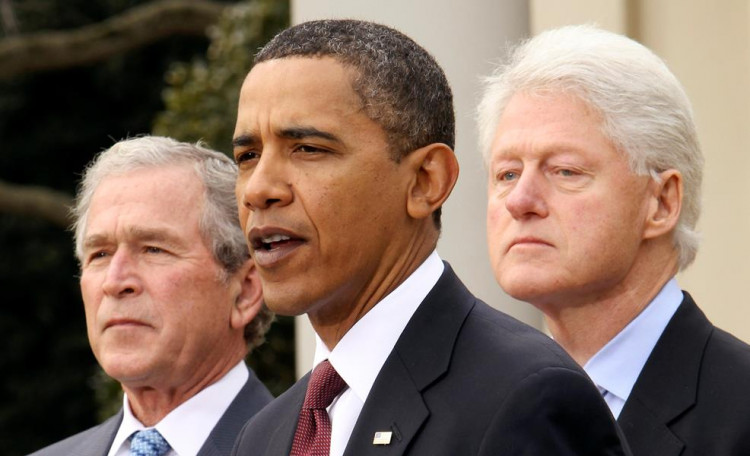In the wake of President Joe Biden's announcement that he will not seek re-election, former President Barack Obama has refrained from endorsing Vice President Kamala Harris, opting instead to express confidence that the Democratic Party will find a suitable candidate to challenge former President Donald Trump in the 2024 election. This unexpected move has added a layer of complexity to an already tumultuous political landscape.
"We will be navigating uncharted waters in the days ahead," Obama wrote. "But I have extraordinary confidence that the leaders of our party will be able to create a process from which an outstanding nominee emerges."
Biden, 81, revealed his decision to step down from the presidential race on July 21, citing concerns over his mental acuity and stating that it would be in the best interest of his party and the country. In his announcement, he threw his full support behind Harris, urging Democrats to rally around her. "My very first decision as the party nominee in 2020 was to pick Kamala Harris as my Vice President. And it's been the best decision I've made. Today I want to offer my full support and endorsement for Kamala to be the nominee of our party this year. Democrats - it's time to come together and beat Trump. Let's do this," Biden declared.
However, Obama's statement did not echo Biden's endorsement. Instead, he emphasized the need for a robust selection process to identify the best candidate. "I believe that Joe Biden's vision of a generous, prosperous, and united America that provides opportunity for everyone will be on full display at the Democratic Convention in August. And I expect that every single one of us is prepared to carry that message of hope and progress forward into November and beyond," Obama said.
The absence of an endorsement from one of the most influential figures in the Democratic Party could significantly impact Harris's campaign. Obama's non-committal stance may encourage other potential candidates to enter the race, adding to the uncertainty and competition within the party. Obama and former First Lady Michelle Obama extended their gratitude to Biden and First Lady Jill Biden for their leadership during what they described as "perilous times."
Obama's reluctance to endorse Harris is echoed by other prominent Democrats. Former House Speaker Nancy Pelosi also refrained from endorsing Harris, instead focusing on Biden's legacy. "With love and gratitude to President Biden for always believing in the promise of America and giving people the opportunity to reach their fulfillment. God blessed America with Joe Biden's greatness and goodness," Pelosi stated.
The lack of unanimous support for Harris among Democratic leaders highlights the challenges she may face in uniting the party. Some Democrats fear that her candidacy could weaken the party's chances against Trump, citing her low approval ratings and perceived missteps in her role as vice president. According to RealClearPolitics, Harris currently holds a 38.1% favorability rating, trailing behind Biden's 39.1% and Trump's 42.8%.
Senator Richard Blumenthal of Connecticut and Senator Peter Welch of Vermont have both expressed support for an open and democratic process to select Biden's replacement. Blumenthal stated he prefers a "responsive, democratic process," while Welch advocated for a "truncated process" to ensure a fair selection.
Democratic strategist and Senator Kevin Cramer of North Dakota noted, "I don't think I'd be revealing any sort of polling secrets if I said Michelle Obama would probably be the one person that could step in and keep the party united and probably provide a little bit of a moving start because of her obvious notoriety." This sentiment is shared by various Democrats who believe a more prominent and unifying figure might be necessary to secure a victory in the upcoming election.
Illinois Governor JB Pritzker, another potential contender, did not immediately endorse Harris, instead emphasizing the need to prevent a Trump victory. "I will work every day to ensure that [Trump] does not win in November," Pritzker tweeted.
The Democratic Party now faces a critical juncture as it seeks to navigate the transition from Biden's leadership and find a candidate capable of defeating Trump. The upcoming Democratic National Convention, set for August 19-22 in Chicago, will be pivotal in determining the party's direction and nominee. With Obama and other key figures withholding immediate endorsements, the path to the nomination remains wide open, setting the stage for a potentially contentious and transformative selection process.
As the party grapples with these developments, Harris has vowed to unite Democrats and earn the nomination. "I am honored to have the president's endorsement, and my intention is to earn and win this nomination," she stated. The coming weeks will be crucial as Harris and other potential candidates campaign for support and prepare for the convention that will shape the future of the Democratic Party and its strategy to counter Trump's bid for a return to the White House.






